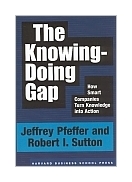|
||
• wydawnictwa polskie
• Zamów informacje o nowościach z wybranego tematu • kontakt
• Cookies na stronie |
THE KNOWING-DOING GAPPFEFFER J., SUTTON R.wydawnictwo: HBS PRESS , rok wydania 2000, wydanie Icena netto: The Knowing-Doing Gap How Smart Companies Turn Knowledge into Action The Knowing-Doing Gap is sure to resonate with businesspeople everywhere who struggle daily to know more and do more with what they know. It is a refreshingly candid, useful, and realistic guide for improving performance in today's business. The so-called knowledge advantage is a fallacy even though companies pour billions of dollars into training programs, consultants, and executive education. The reason is not that knowledge isn't important. It's that most companies know, or can know, the same things. Moreover, even as companies talk about the importance of learning, intellectual capital, and knowledge management, they frequently fail to take the vital next step of transforming knowledge into action. The Knowing-Doing Gap confronts the paradox of companies that know too much and do too little by showing how some companies are successful at turning knowledge into action. Jeffrey Pfeffer and Robert Sutton, well-known authors and teachers, identify the causes of the knowing-doing gap and explain how to close it. The message is clear firms that turn knowledge into action avoid the "smart talk trap." Executives must use plans, analysis, meetings, and presentations to inspire deeds, not as substitutes for action. Companies that act on their knowledge also eliminate fear, abolish destructive internal competition, measure what matters, and promote leaders who understand the work people do in their firms. The authors use examples from dozens of firms that show how some overcome the knowing-doing gap, why others try but fail, and how still others avoid the gap in the first place. Jeffrey Pfeffer is the Thomas D. Dee Professor of Organizational Behavior at Stanford Graduate School of Business. He is the author of The Human Equation, Managing with Power, and Competitive Advantage through People, all from HBS Press. Robert I. Sutton is Professor of Organizational Behavior at Stanford's School of Engineering, where he is Co-Director of the Center on Work, Technology, and Organization. 314 pages Księgarnia nie działa. Nie odpowiadamy na pytania i nie realizujemy zamówien. Do odwolania !. |


